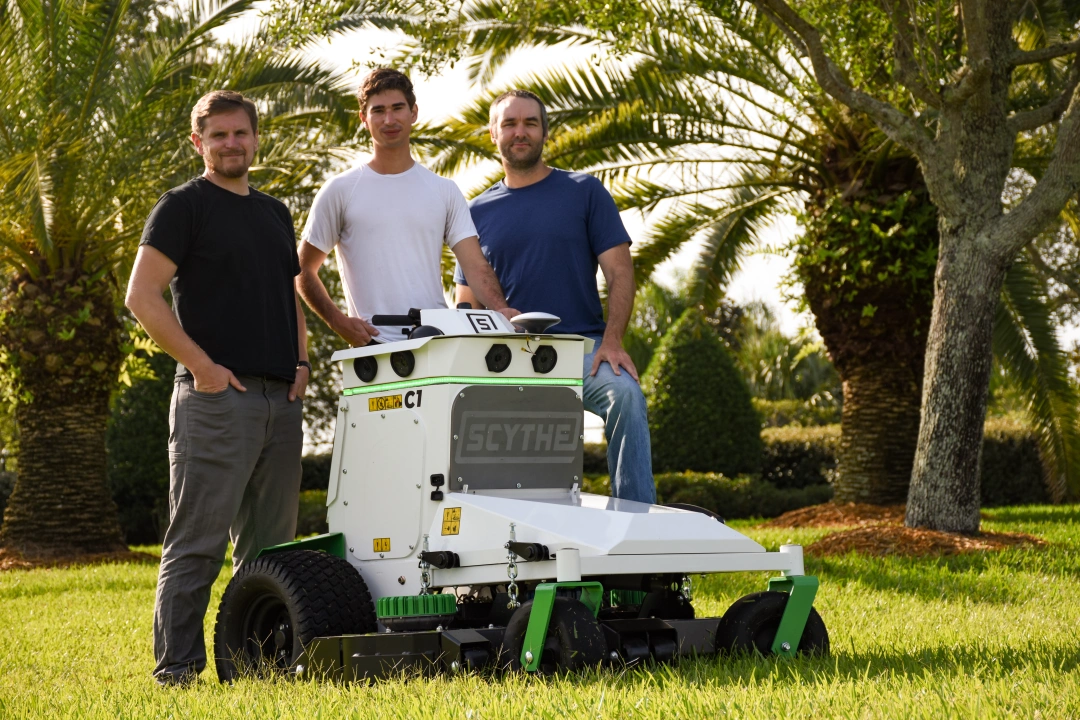
The founders of Scythe Robotics with one of the company’s lawn mowers. (Scythe Robotics via Denver Post)
Robo-mowing startup Scythe Robotics just put $12 million in the bagger, according to a recent SEC filing.
This comes months after the company announced it would double its production space in Longmont and add nearly 400 jobs in connection with receiving state tax incentives.
The company, founded in 2017 by CEO Jack Morrison and Isaac Roberts, makes all-electric lawn mowers that can be operated either manually or autonomously, by initially riding the mower around the perimeter of the lawn to allow the machine to learn the boundaries. It then mows on its own, striping lawns as a normal operator would.
The machine creates fewer emissions than a regular gas-powered mower, and it helps cut costs on maintenance and labor, the company said.
The $12 million is a part of a larger campaign to raise $20 million, filings show, and it marks Scythe Robotics’ third round of investments. In fall 2020, the company raised nearly $14 million, a filing said. In January 2022, it announced another $42 million in funding, led by Energy Impact Partners.
Scythe Robotics did not respond to requests for comment from BusinessDen.
The M.52, its newest and first full-production model, robo-mows using the same autonomous vision technology as a Tesla, according to trade publication Landscape Management. Eight cameras give it a 360-degree view, according to Scythe’s website. An accompanying app can serve as a remote control and also alert landscapers to move an obstacle in the mower’s way.
Instead of selling its mowers, the company leases them out to landscaping companies on a monthly subscription, Landscape Management reported. A base charge gets customers the mower, maintenance and a guide on how to operate the machine manually. There is also an added charge per every autonomous acre mowed.
“Recurring revenue and subscriptions are all the rage in the start-up tech world where we came from,” CEO Morrison told the publication.
Mowers can be leased only in multiples of 100, Scythe’s website shows. They hit the turf earlier this year with dozens of companies in Florida and Texas, Landscape Management reported.

The founders of Scythe Robotics with one of the company’s lawn mowers. (Scythe Robotics via Denver Post)
Robo-mowing startup Scythe Robotics just put $12 million in the bagger, according to a recent SEC filing.
This comes months after the company announced it would double its production space in Longmont and add nearly 400 jobs in connection with receiving state tax incentives.
The company, founded in 2017 by CEO Jack Morrison and Isaac Roberts, makes all-electric lawn mowers that can be operated either manually or autonomously, by initially riding the mower around the perimeter of the lawn to allow the machine to learn the boundaries. It then mows on its own, striping lawns as a normal operator would.
The machine creates fewer emissions than a regular gas-powered mower, and it helps cut costs on maintenance and labor, the company said.
The $12 million is a part of a larger campaign to raise $20 million, filings show, and it marks Scythe Robotics’ third round of investments. In fall 2020, the company raised nearly $14 million, a filing said. In January 2022, it announced another $42 million in funding, led by Energy Impact Partners.
Scythe Robotics did not respond to requests for comment from BusinessDen.
The M.52, its newest and first full-production model, robo-mows using the same autonomous vision technology as a Tesla, according to trade publication Landscape Management. Eight cameras give it a 360-degree view, according to Scythe’s website. An accompanying app can serve as a remote control and also alert landscapers to move an obstacle in the mower’s way.
Instead of selling its mowers, the company leases them out to landscaping companies on a monthly subscription, Landscape Management reported. A base charge gets customers the mower, maintenance and a guide on how to operate the machine manually. There is also an added charge per every autonomous acre mowed.
“Recurring revenue and subscriptions are all the rage in the start-up tech world where we came from,” CEO Morrison told the publication.
Mowers can be leased only in multiples of 100, Scythe’s website shows. They hit the turf earlier this year with dozens of companies in Florida and Texas, Landscape Management reported.
